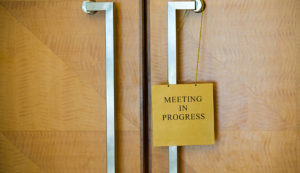Who can attend HOA meetings? When it comes to annual meetings and board meetings, are all homeowners allowed to attend? Let’s find out.
In this article:
Understanding Who Can Attend HOA Meetings
Homeowners association meetings are an important part of HOA living. They allow members to stay up-to-date on critical issues within the community. But, are these meetings open to all people?
Generally, homeowners associations are considered non-profit private organizations. Therefore, those who are outside of the association, i.e. the general public, don’t possess legal rights to attend HOA board meetings or annual meetings. The matters discussed at these meetings relate to the association, so it makes sense for them to be closed to the public.
In that case, who can attend HOA board meetings and annual meetings? To know the answer to this question, you must look at two things: State laws and your governing documents.
Most states remain mum on the issue or confer the decision to individual associations by way of their governing documents. In California, Civil Code Section 4925 dictates that any member may attend the non-executive portion of board meetings. Your governing documents will usually tell you who qualifies as a member.
For a majority of HOAs, members are those who own lots or units within the association. This means that only those whose names appear on the unit or property title can attend.
Of Spouses, Tenants, and Attorneys
 Since HOA meeting requirements, as stipulated in most governing documents, only allow members whose names appear on the title, that typically means spouses, tenants, and attorneys of members can’t attend. Of course, not all associations impose this provision strictly.
Since HOA meeting requirements, as stipulated in most governing documents, only allow members whose names appear on the title, that typically means spouses, tenants, and attorneys of members can’t attend. Of course, not all associations impose this provision strictly.
Many associations do permit members to bring their spouses to HOA meetings. But, if a spouse starts to misbehave, they may be removed and banned from attending future meetings.
As for tenants, attorneys, and real estate agents, industry practice is to disallow them from attending. Some HOA boards do allow tenants to attend meetings, but they must not behave inappropriately. Legally, though, tenants don’t have a right to attend such meetings.
An attorney, on the other hand, might be allowed to attend a meeting if they are already a member of the HOA in the first place. Industry practice, though, is to prohibit attendance if the attorney is not a member and would like to attend the meeting as a representative of a member.
The same applies to real estate agents. These agents don’t have a legal right to attend HOA meetings, but the board may give them permission at their own discretion.
Open Meetings and Executive Sessions
Do HOA board meetings have to be public? There are two types of board meetings — one that is open to all members and one that isn’t. The first one is known as an open meeting or open session, while the second is known as an executive session. The executive session usually takes place immediately before or after an open meeting.
Can homeowners attend board meetings? Although homeowners do have a right to attend board meetings, that only applies to open board meetings. When a board adjourns to an executive session, homeowners can no longer sit in.
During executive session, board members discuss confidential or more sensitive topics. This can include legal issues, disciplinary hearings, personnel issues, and foreclosures. One of the most important HOA board member requirements when it comes to executive meetings is confidentiality. Board members must keep all discussions held in executive session private.
Restricting Attendance at HOA Meetings
If your HOA board intends to place restrictions on who can attend HOA meetings apart from the members, you must remember to follow proper procedures. Don’t just suddenly adopt a restriction to address a problem with attendees. Make sure to enact rules according to the protocols set forth by your bylaws and CC&Rs. You must also see to it that all community members know of this new rule or rule change.
Moreover, you must always enforce the restriction consistently and without bias. Selective enforcement can lead to unsavory consequences for the board and the association.
If a member has a disciplinary hearing scheduled, you may also want to consider allowing their attorney to attend. This is, of course, a special case. Industry practice is to prohibit attorneys from attending HOA meetings.
It’s also up to your board whether or not to allow vendors to attend HOA meetings. In some cases, vendors can offer valuable insight and present what services they have for the association. Other times, they can be a distraction. The trick is to strike the right balance. Let them attend meetings but not always.
Can Homeowners Speak at HOA Board Meetings?
Most state laws and governing documents allow homeowners time to voice their concerns and opinions during open board meetings. This is known as an open forum.
Open forums tend to get out of hand when there are no rules to restrict them. Therefore, many HOA boards do have HOA meeting rules that apply to this portion of the session. For instance, the board may allow only a limited amount of time for the open forum. You may also provide each member with reasonable time limitations to speak their mind. It’s also common to prohibit aggressive or inappropriate behavior.
Board meetings strictly follow an agenda, but that doesn’t mean homeowners can only address the board on issues relating to that agenda. Homeowners are typically free to bring up other issues outside of the agenda set for the meeting. But, board members don’t need to resolve the issue on the spot. In fact, if it’s not on the agenda and is not an emergency issue, it’s best to note down the concern and discuss it during the next board meeting.
About “Working” HOA Meetings
 Can HOA board members meet in private? Board members do meet in private when they go into executive session prior to or following an open meeting. The executive session usually involves all board members and, sometimes, the HOA manager.
Can HOA board members meet in private? Board members do meet in private when they go into executive session prior to or following an open meeting. The executive session usually involves all board members and, sometimes, the HOA manager.
What if the meeting is not an executive session? Can two HOA board members meet in private? Some associations have started to hold what is known as “working” meetings. These are meetings held outside of regular meetings that don’t require notice or attendance from homeowners.
Although it’s admirable to want to work even outside of official board meetings, it’s generally not recommended. Board members must not exclude homeowners when they make decisions, which usually takes place during official board meetings. Holding and participating in working meetings can put the board and the HOA at risk of potential liability.
Working meetings may also violate state laws. The Open Meeting Act in California, for instance, clearly states that board members must not take action on any association business outside of a board meeting. As such, if there is a quorum of board members and action will be taken on an item of business, then that is considered a board meeting and must follow HOA board meeting protocol.
Keeping Up With HOA Matters Outside of Attending Meetings
Just because a resident’s name doesn’t appear on the title doesn’t mean they have no way of knowing what transpired at HOA meetings. Many states and governing documents require the HOA to take minutes at meetings. These minutes should tell you everything you need to know about what decisions and discussions were made.
Are HOA meeting minutes public record? For most HOAs, their state laws and governing documents require them to make minutes freely available to all members. In California, for instance, Civil Code Section 4950 mandates that open board meeting minutes must be available to members within 30 days of the meeting. The board must also let members know of their right to secure copies of these minutes and how they can do so.
Key Takeaway
It is necessary for both board members and homeowners alike to know who can attend HOA meetings. This way, you can avoid potential problems and exercise control. While it is clear that there are many moving parts to this topic, remember that the general rule is that HOA members can attend HOA meetings provided they are held in open session.
Understanding your state laws and governing documents is critical to community management, including handling meetings.








Leave a Reply